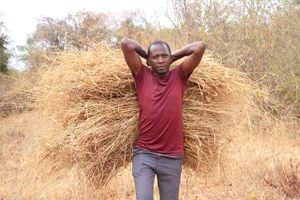
Maize farmers in the North Rift region have taken the government to task over the deteriorating buying prices for the crop.
Maize farmers in the North Rift region have taken the government to task over the deteriorating buying prices for the crop amidst reduced budgetary allocations to the agriculture sector, which has pushed up production costs.
The farmers have rejected the Sh3,500 being offered by the government through the National Cereals and Produce Board (NCPB), noting that the reduced buying prices were affecting investment in the sub-sector and prompting them to reduce acreage under production of the crop to cut losses.
“The declining trend of maize buying prices offered by the government is a major blow to farmers who bank on attractive returns to cope with the increased production cost as a result of the global rise in the cost of farm input to invest in the next crop,” said Kipkorir Menjo, a director at Kenya Farmers Association (KFA).
The government maize buying prices have been on a downward trend for the past three seasons, offering Sh4,500 per 90kg bag in 2023, Sh4,000 in 2024 and Sh3,500 in 2024/25 period amid bumper harvest.
The budget allocation to the sector has also been on a decline, with the sector receiving Sh84.9 billion in the 2024/25 financial year, down 0.2 percent from Sh87 billion the previous financial year.
“Farmers have emerged losers in previous national budgetary allocations due to slashed funds to the sector against the rising cost of farm inputs and unsteady market for the produce,” said Joshua Lang’at from Burende, Nandi County.
Agriculture Cabinet Secretary Andrew Karanja said the government would buy 1 million bags of maize at Sh3,500 per 90kg, amounting to Sh3.5 billion for the National Strategic Food Reserve. He said the prices would enable farmers to maintain their profit margins.
“We project a bumper harvest as compared to last season when we managed between 40 and 60 million bags but about 75million bags of 50 kg will be realized this season,” Dr Karanja said while defending the set maize prices, arguing that it will help maintain unga prices at the current Sh130 per 2kg packet.
Agriculture Principal Secretary Dr Paul Ronoh had earlier indicated during a tour of Eldoret that the government would maintain the price at Sh4,000 per 90kg of maize.
Farmers interviewed said NCPB acts as a market stabiliser and fixing prices at Sh3,500 will expose them to exploitation by middlemen who have flocked to the region to buy the crop at Sh2,500 per 90kg bag.
“It is unfortunate that the government has failed to put in place clear market policies for agricultural products. Fixing maize prices at Sh3,500 might force farmers to go back to the streets as witnessed in the past unless, the government comes up with clear policies, including offering attractive prices to support agriculture, which forms our economic blood vein by allocating more funds to buy the crop,” said David Kosgei from Sergoit, Uasin Gishu County.
Lawmakers from maize-growing zones are under pressure from farmers to compel the government to allocate funds in the supplementary budget to buy the crop at attractive prices of above Sh4,000 per 90kg bag.
“Farmers are anticipating a bumper maize harvest this season and appeal to the NCPB commence buying the crop at above to enable farmers to break even and earn a profit,” said Moiben MP Phyllis Bartoo.
It costs a farmer Sh4,500 to plough an acre of land, with the production of a 90-kilogramme bag of maize estimated at Sh1,700, the highest in the East African region.
The government usually sells fertiliser at Sh2,500 per bag, but the distribution of this vital agricultural input has been marred by scandals. The fertiliser is now sold at Sh3,500, which farmers say is too expensive.
Mzee Kipruto Kirwa of Natwana village, Uasin Gishu County, cultivates 30 acres of maize and produces about 700 bags, but the high cost of inputs – fertiliser and maize seed – makes the investment unviable.
He spends Sh6,000 per acre on ploughing and harrowing, another Sh1,500 per acre on planting and another Sh4,500 on 25 kilogrammes of maize seed, enough for two acres of land.
“It costs me Sh1,300 per acre for top dressing, another Sh10,000 for herbicide and pest control,” said Mzee Kirwa, while calling on the government to allocate at least 10 percent of the national budget to the sector, which forms the backbone of the economy.
He admits that maize production has declined from 30 bags per acre to about 20 bags due to high acidity as the soil continues to lose its fertility.
It costs farmers between Sh1,500 and Sh2,000 to carry out sampling to determine the acidity level of their soil.
“The unsteady supply of maize in the market and the projected low yield due to erratic climatic condition is forcing many farmers to hoard part of the produce,” said Mzee Kirwa.
Small-scale farmers have described the declining budget allocation to agriculture as an indication that the government is not committed to tackling the recurrent food shortages.
“Food shortage will be unavoidable unless the government subsidises the cost of farm inputs and ensures market for the produce at affordable rates,” said Ms Susan Sum from Cheptiret, Uasin Gishu County.
Agricultural experts asked the government to review its fiscal policy, arguing that it had neglected small-scale farmers.
“The budget allocation has overlooked small-scale farmers who contribute to food security at household level at the expense of large-scale farming targeting cash crops targeting exports,” said Domenic Kirui, a food expert.
Some farmers are considering reducing acreage under cultivation of the crop next season to mitigate losses as they diversify into other lucrative sub-sectors such as horticulture.












